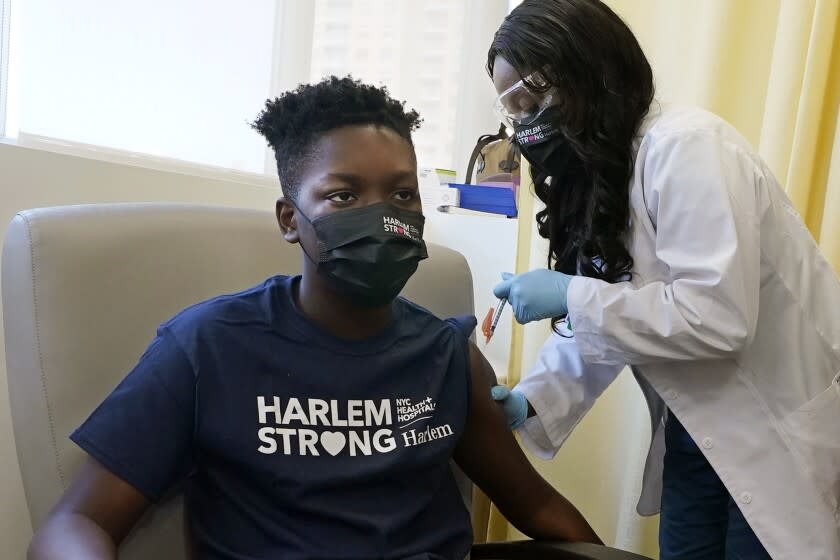Editorial: Vaccines are safe. So why shouldn't teens be able to get them on their own?

California teenagers should have the right to protect their health by receiving approved vaccines without parental consent or knowledge.
But in many cases, they do not. State law allows minors ages 12 and older to consent to various reproductive and preventive health treatments, including abortions, vaccines for HPV and other sexually transmitted diseases and mental healthcare. But they are not allowed to consent to virtually all other vaccines, including for COVID-19, putting them at personal risk and adding another barrier to community disease prevention.
Senate Bill 866 would change that by allowing minors 15 and older to get a vaccine that has been approved by the U.S. Food and Drug Administration and the Centers for Disease Control and Prevention without needing consent of a parent or guardian.
Parents rightfully have oversight of most of their children’s healthcare. But as vaccine misinformation has spread in recent years, they don’t always act in their kids' best interests. False information proliferating on social media has incorrectly linked vaccines to autism, infertility and even death.
This bill could also benefit teens whose parents may believe in the safety of vaccines but are too busy working to find time to get a shot or face language barriers to getting themselves and their children inoculated. Health officials say that teens frequently visit clinics seeking vaccinations but are turned away if they’re unable to demonstrate parental consent.
Denying minors the right to protect themselves also increases risks for viral outbreaks — and not just COVID-19. Last week, health authorities announced they had detected polio in New York City wastewater after a man contracted the virus last month, leaving him with paralysis. A senior official at the CDC suggested there may be hundreds of cases already circulating.
The reappearance of diseases once considered largely eradicated in the U.S., such as polio and measles, should come as no surprise given the rise of vaccine hesitancy driven by the proliferation of vaccine misinformation. And climate change increases the risk of new diseases emerging. As global temperatures rise, according to Johns Hopkins public health scholar Gigi Gronvall, insects and animals are venturing from their native habitats in search of better climates, which increases the risk of disease transmission.
Some opponents of SB 866, including the California Health Coalition Advocacy, argue that the bill restricts parents' rights. They aren't wrong. The bill does restrict the rights of parents to deny their children access to life-saving and safe immunizations. The health of teenagers old enough to seek an immunization ought to trump the beliefs of misinformed parents. North Carolina, Oregon and Alabama have allowed minors to receive FDA-approved vaccines without parental consent for years.
No part of this bill would allow minors to walk into a pharmacy and receive a vaccine without screening for allergies, previous or current conditions and medical histories, as some opponents of the bill have alleged. Per CDC guidelines, vaccines must be administered by licensed health professionals.
Teenagers in California are already allowed to make vital medical choices on their own. Obtaining a safe and approved vaccine ought to be one of those choices available to them. Legislators have until Aug. 31 to pass SB 866. They should do so.
This story originally appeared in Los Angeles Times.

